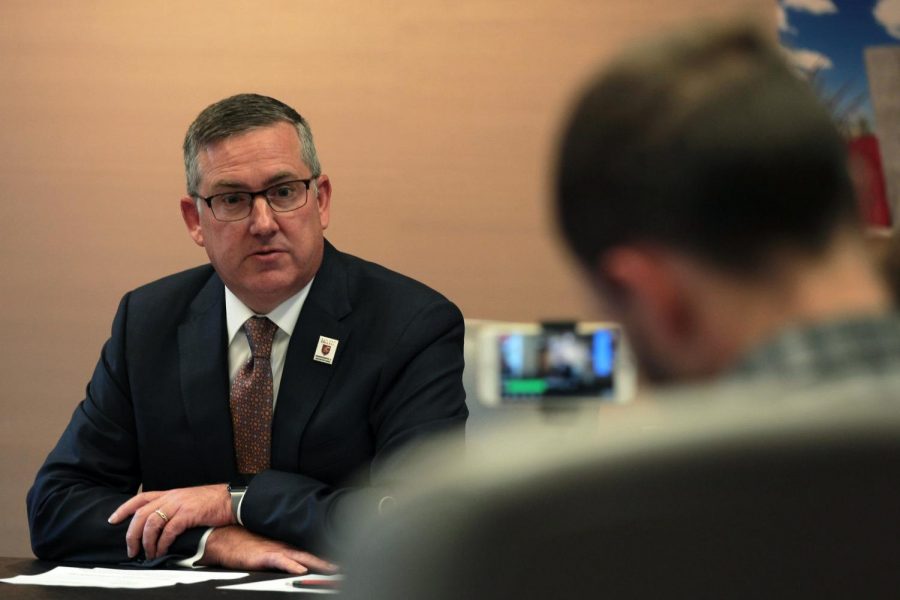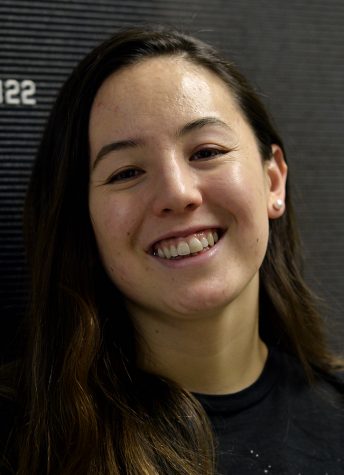Schulz talks budget, mental health, enrollment
BEN SCHUH | DAILY EVERGREEN FILE
WSU President Kirk Schulz addresses university finances and future admissions trends while talking with reporters at a press conference held Aug. 22 at the Lewis Alumni Centre.
September 8, 2018
During a meeting with The Daily Evergreen on Friday, WSU President Kirk Schulz and Phil Weiler, vice president of marketing and communications, addressed university issues including the budget, mental health services, the Cougar Athletic Fund and university transparency.
Mental Health
Although the death of Tyler Hilinski earlier this year raised awareness of mental health issues on campus, the university is looking to improve mental health services for all students, not just athletes, Schulz said. Mental health is a rising area of concern for campuses across the U.S.
“We had a number of suicides, unfortunately, this last year and even some this summer,” Schulz said. “If you talk to public and private university presidents anywhere around the country and you ask, this is one of the number one things they’re concerned about.”
Weiler said he’s glad there are more people seeking help with their mental health concerns.
“I think there’s an increased need for us to address that and an increased awareness that students should reach out for help,” he said.
Right now, mental health services are short-staffed, Schulz said. WSU is currently looking to fill three positions for psychological services. Schulz said he doesn’t know yet how much those three additional providers will cost the university.
Still, mental health is an issue the university has identified as a priority, he said.
“We don’t have enough staff to be able to respond to everybody the way we would like to,” he said.
Over time Schulz hopes to build up those services, but he said between a limited budget and the university’s location, finding providers will be a challenge.
“In the actual Pullman-Moscow community, there’s a severe shortage of mental health professionals,” Schulz said. “In a budget constrained environment, it’s difficult to hire the people we would like to.”
Budget
The university is on target to surpass its goals of reducing its multi-million-dollar deficit, Schulz said.
“The gap was over $30 million,” he said. “We had a goal to reduce it from $30 million down to $20 million and we’ve definitely exceeded that.”
The university did spend more overall this year, Schulz said, but increased its fundraising significantly.
A large part of the increased funds are thanks to donations from the Cougar Athletic Fund, Schulz said. He credited much of that increased revenue to work by the new Director of Athletics Pat Chun.
“We have an athletic director who’s not just telling people what to do, he’s leading the way,” he said. “I’m really optimistic about the future on the fundraising side of athletics.”
That work has led to significant increases in revenue, Schulz said.
“We have the largest, best fundraising mechanism for the Cougar Athletic Fund we’ve ever had,” he said. “It exceeded the previous year by almost a million.”
Part of the university’s progress in decreasing its budget is also thanks to faculty working harder than ever to make the most of their current resources, Schulz said.
“A lot of our faculty and staff have really rolled up their sleeves and done more,” he said.
However, he acknowledged that “you can only do more with less for so long before it starts eroding quality and things like that.”
Schulz said that despite misconceptions, athletics has also been cutting back its spending.
“Some of our faculty and staff have said we don’t see any cuts,” he said. “They want to know, if everybody’s supposed to cut spending why doesn’t athletics? And the fact is, they do.”
Student enrollment
With WSU’s record high enrollment this school year, Schulz said the university has been working to accommodate for the large freshman class.
“Our enrollment is amazing,” he said. “We had such a large incoming class that wants to be part of WSU and I think that’s a real positive for us.”
WSU is also seeking to slowly build up its international student population, he said.
“Our percentage of students from abroad is about 7 percent and that probably needs to double,” Schulz said.
The main goal of increasing recruitment is to create a more diverse campus that prepares students for a “global marketplace,” Schulz said. But the program has an added benefit of increasing revenue.
Schulz said he couldn’t give the exact breakdown of how much money the university makes after INTO, the company WSU pays to recruit international students, but the revenue does make a difference, he said.
“I don’t want people thinking ‘well, you’re just doing it for money.’ But the financial implications for a program like that are important,” he said.
The recruitment process with INTO is different than that of other students, Schulz said, but the university and faculty still have the same decision power.
“There’s some implications that we’ve lost the ability to choose who we recruit,” he said. “We still have control.”
Transportation
Schulz also addressed the planned one-month closure of the Pullman-Moscow Regional Airport next year, which will happen in the middle of football season.
“Once we know exactly the dates, we’ll have to work very closely with folks to have some plans and alternatives,” he said. “I’ve already heard from some of our alumni that they’re concerned.”
The university is “worried” about the closure, Schulz said, which will not only affect athletics, but the ability to travel to and from conferences or fly in university donors.
“The good news is that when it opens back up then we’ll have the same instrumentation here as they do in Spokane, so out reliability here should go way up,” he said. “I think it’s going to be great when it’s done, but it’s going to be a little bit of a hassle before that.”










